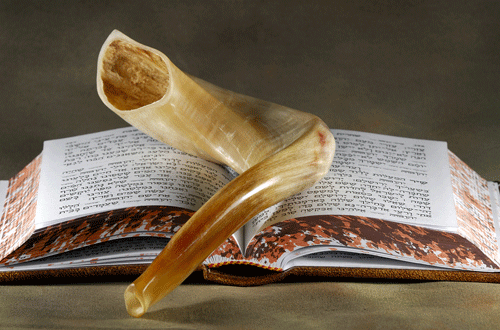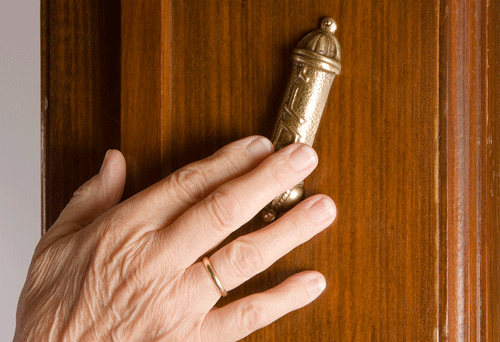Yom Kippur, The Day of Atonement, is the holiest day of the year on the Jewish calendar. Should Christians, believers in Jesus (Y’shua), observe Yom Kippur?
First, let’s understand the origins of this day, what the day means to the Jewish people, and if the day has relevance to non-Jewish (or Jewish) believers in Jesus (Y’shua).
(The following is excerpted from God’s Rhythm of Life)
Symbolized by a mezuzah case and scroll, representing the entire household’s restatement of commitment. The mezuzah, a case containing Scriptures, is attached to the doorframe. The Scriptures are Deuteronomy 6:4-9, 11:13-21, and Numbers 15:37-41. These are called the Sh’ma Yisrael, which means, “Hear, O Israel..”
Leviticus 23:26. And the Lord spoke to Moses, saying, 27. Also on the tenth day of this seventh month there shall be a day of atonement; it shall be a holy gathering to you; and you shall afflict your souls, and offer an offering made by fire to the Lord. 28. And you shall do no work in that same day; for it is a day of atonement, to make atonement for you before the Lord your God. 29. For whatever soul it is who shall not be afflicted in that same day, he shall be cut off from among his people. 30. And whatever soul it is who does any work in that same day, the same soul will I destroy from among his people. 31. You shall do no kind of work; it shall be a statute forever throughout your generations in all your dwellings. 32. It shall be to you a Sabbath of rest, and you shall afflict your souls; in the ninth day of the month at evening, from evening to evening, shall you celebrate your Sabbath.
This day is a full Sabbath, and a full fast, with not even water from sundown to sundown. Regarding work, this is the only Season of the Lord with the same restrictions as the weekly Sabbath. The purpose of this day is to repent for not being as good a person as you could have been the year just ended, and to vow to be better during the year just starting. The shofar is blown as a call to repentance, which Christians still need. Most Christians are free from sins of immorality, murder, theft, but none of us in perfect. We all sin with our speech, saying things that hurt others – often not aware that the other is offended. We also fail to lift up someone who needs an encouraging word. This is sin, without even mentioning jealousy, greed, pride, gossip, slander, or lust. Each one needs to be more sensitive to the Spirit so we can truly let God’s love shine through us more and more, increasing year by year.
It is important for Christians to recognize that even though we are made righteous by faith and by the blood of the Lamb, we are not to be presumptuous, because none of us has been perfected and we all need to be better this coming year than we have been the year now ending. It is this desire to truly be the people God wants us to be that drives us to walk in repentance every day of the year, but to be especially watchful during this time that His instructions have established a season of repentance, to remember all that God has done for each of us and to strive to be better the coming year.

The shofar is blown as a call to repentance, which Christians still need.
Popular Bible teacher and speaker Margaret Feinberg offers Christians some practical ways to observe The Day of Atonement in her excellent post from 2014: 3 Ways to Celebrate Yom Kippur as a Christ Follower
1. Don’t wait another day to extend radical forgiveness.
Yom Kippur and the Days of Awe center around forgiveness and establishing right relationships with one another. Matthew 6:14-15 reminds us “For if you forgive other people when they sin against you, your heavenly Father will also forgive you. But if you do not forgive others their sins, your Father will not forgive your sins.” When you don’t have the grace or strength to forgive, ask God to supply both of those in greater measure. Try this today and experience the joy and wonder that comes with forgiveness.
2. Consider fasting for a meal or an entire day.
During your time of fasting, spend time in prayer and reflect on the truth that everything we have comes from God. End your fast by reading Psalm 107:8-9: “Let them give thanks to the Lord for his unfailing love and his wonderful deeds for mankind, for he satisfies the thirsty and fills the hungry with good things.”
3. Gather your family and friends for a tashlich ceremony.
During a tashlich ceremony, people of the synagogue go down to a local stream or river, and empty their pockets of crumbs, symbolizing their sins being washed away. Read Hebrews 10:1-25 together as you celebrate Christ as the once-and-for-all sacrifice for your sins.


So very disappointed that you stated Yom Kippur as a Jewish holiday on the Jewish calendar. It is the LORD’s Holy Day on his calendar.
Hi Ann,
Thank you for writing.
Where did I ever say Yom Kippur was a Jewish Holiday? Read my book “God’s Rhythm of Life”. I always refer to the Seasons of the LORD as such. To call Yom Kippur a Jewish holiday was no cleared through me.
Blessings, Bill
Sweet spirit!
Hi Ann,
Thank you for writing.
Please read that article again because it does not say a Jewish calendar, but Yom Kippur is the holiest day on the Jewish calendar, which should a calendar used by all all Christians. Yom Kippur is the holiest day on the Jewish calendar. That does not refer to Yom Kippur as a Jewish holiday, but simply states that Yom Kippur is the holiest day on a Jewish calendar.
Blessings, Bill
I enjoyed reading the whole Bible verse and the Holy Spirit it made my night a lot more Blessed!
Shalom Broderick,
Thank you very much.
Blessings, Bill
It should be understood this not a Jewish holiday but is one of G-ds ordained holy days. Every one should celebrate it every day to be reminded Yeshua’s sacrifice.
‘
Hi Frank,
Thank you for writing.
Calling Yom Kippur a Jewish holiday was not written by me. Se my book, “God’s Rhythm of Life”. I always refer to the Seasons of the LORD as such.
Blessings,
Bill
Hi Frank,
Thank you for writing. The article does not refer to Yom Kippur as a Jewish holiday, but goes on to state that Christians need to honor Yom Kippur. Honoring Yom Kipppur is definitely to be done by Christians.
Blessings, Bill